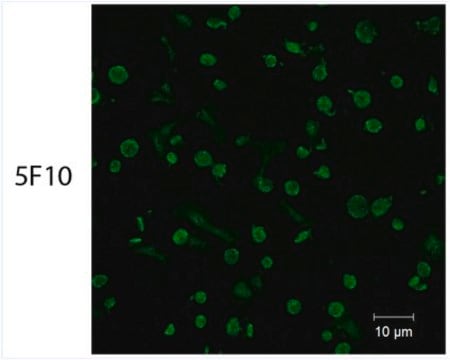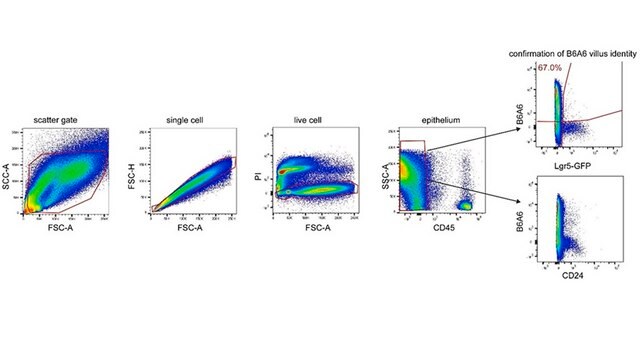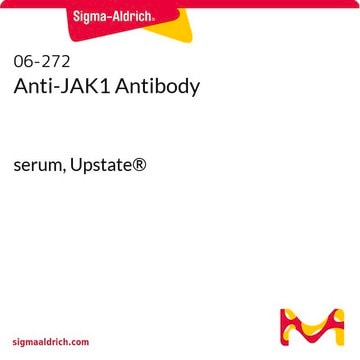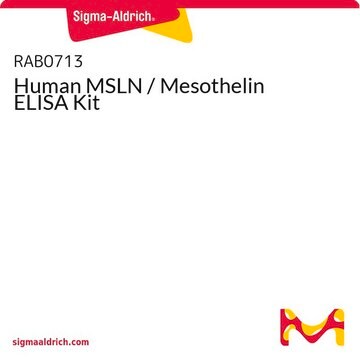MABS1299
Anti-PAR4 Antibody, clone 14H6
clone 14H6, from mouse
Synonym(s):
Proteinase-activated receptor 4, PAR-4, Coagulation factor II receptor-like 3, Thrombin receptor-like 3
About This Item
ICC
WB
immunocytochemistry: suitable
western blot: suitable
Recommended Products
biological source
mouse
Quality Level
antibody form
purified immunoglobulin
antibody product type
primary antibodies
clone
14H6, monoclonal
species reactivity
human
technique(s)
flow cytometry: suitable
immunocytochemistry: suitable
western blot: suitable
isotype
IgG2bκ
NCBI accession no.
UniProt accession no.
target post-translational modification
unmodified
Gene Information
human ... F2RL3(9002)
Related Categories
General description
Specificity
Immunogen
Application
Immunocytochemistry Analysis: A representative lot detected endogenous PAR4 by fluorescent immunocytochemistry staining of 4% formaldehyde-fixed human platelets. Thrombin treatment diminished PAR4 immunoreactivity (Mumaw, M.M., et al. (2015). Thromb. Res. 135(6):1165-1171)
Flow Cytometry Analysis: A representative lot detected tetracycline-induced expression of exogenously transfected human PAR4 on the surface of HEK293 Flp-In cells. Thrombin treatment diminished cell surface PAR4 immunoreactivity (Mumaw, M.M., et al. (2015). Thromb. Res. 135(6):1165-1171).
Western Blotting Analysis: A representative lot detected MBP fusion proteins containing human PAR4 fragment a.a. 18-78, 41-66, or 48-72. MBP-PAR4 fusion cleavage by thrombin ablolished target band detection by clone 14H6 (Mumaw, M.M., et al. (2015). Thromb. Res. 135(6):1165-1171).
Western Blotting Analysis: A representative lot detected tetracycline-induced expression of exogenously introduced human PAR4 in a HEK293 Flp-In cell line, as well as endogenous PAR4 in isolated human platelets (hPLTs). Thrombin activation of hPLTs diminished PAR4 target band detection (Mumaw, M.M., et al. (2015). Thromb. Res. 135(6):1165-1171).
Quality
Western Blotting Analysis: A 1:250 dilution of this antibody detected PAR4 in 50 µg of human platelet lysate.
Target description
Physical form
Other Notes
Not finding the right product?
Try our Product Selector Tool.
Storage Class Code
12 - Non Combustible Liquids
WGK
WGK 1
Flash Point(F)
Not applicable
Flash Point(C)
Not applicable
Certificates of Analysis (COA)
Search for Certificates of Analysis (COA) by entering the products Lot/Batch Number. Lot and Batch Numbers can be found on a product’s label following the words ‘Lot’ or ‘Batch’.
Already Own This Product?
Find documentation for the products that you have recently purchased in the Document Library.
Our team of scientists has experience in all areas of research including Life Science, Material Science, Chemical Synthesis, Chromatography, Analytical and many others.
Contact Technical Service





